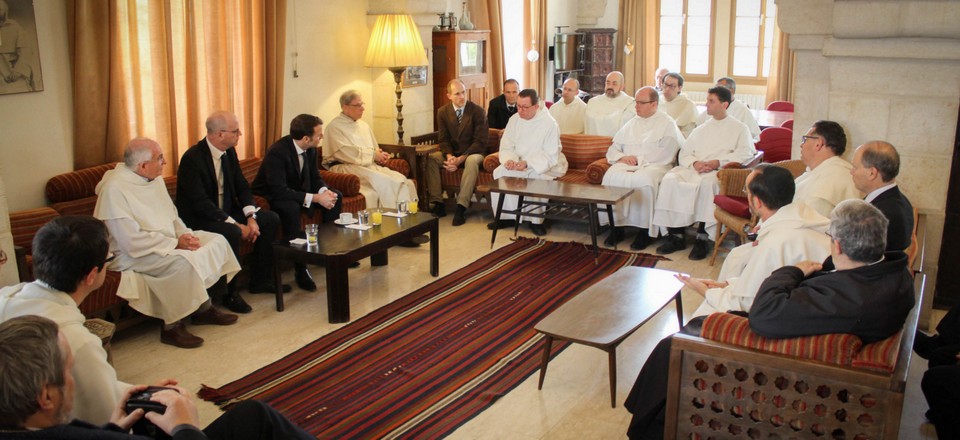JERUSALEM – On January 22 and 23, 2020, French President Emmanuel Macron was in Jerusalem for a two-day official visit to Israel and the Palestinian territories. Accompanied by his delegation, the head of state wandered through the old city, visiting several holy places, Christians, Jews and Muslims. Macron concluded his visit by announcing the creation of a fund for Middle East Christian schools.
Traveling to Jerusalem on January 22 and 23 as part of a two-day official visit to Israel and the Palestinian territories, Emmanuel Macron was accompanied by his Minister of Education, Jean-Michel Blanquer and the Consul General of France, René Troccaz. Also present in the delegation, Msgr. Pascal Gollnisch, Director general of l’Œuvre d’Orient[1], and Charles Personnaz, volunteer mission officer with the association, Director of the National Heritage Institute and author of a report on the Christian heritage and French-speaking schools in the Middle East.
The French head of state insisted on going to the old city to visit the main holy places of Muslims, Jews and Christians: the Basilica of the Holy Sepulcher, where Mr. Macron was able to enjoy a complete visit, entering the Aedicule which houses the original stone of the tomb of Christ; the esplanade of the Al-Aksa Mosque and the Western Wall of the ancient temple in Jerusalem. A lunch with representatives of the Christian communities was also organized at the national domain of Saint-Anne, managed by the White Fathers.
The next day, it was at the Dominican l’École biblique et archéologique française de Jérusalem (EBAF), located on the outskirts of the Old City that the head of state began his day. The Brothers retraced the history of their school, founded in 1890 by Father Marie-Joseph Lagrange, before leading the French President on a visit to the library used by students of biblical sciences or pursuing specialization in archeology, or the history and geography of the Near East. An exchange was also held with representatives of different religious congregations, associations and Christian schools. They were able to take turns in presenting their organizations, and thus make the French President aware of the challenges that the Christian communities face in the various sectors of social life in the Holy Land.
The presence of the Minister of National Education in the presidential delegation, and that of Msgr. Gollnisch, was no coincidence. Indeed, the French president announced on Wednesday evening via his Twitter account his intention to “launch a fund to support the [Christian] schools which train 400,000 young people throughout the region.”
“It is an important decision, according to Msgr Gollnisch, at a time when French-language schools are in a fragile situation (…) This Francophonie contributes to the influence of France obviously, but a little more. This network of Christian schools wants to serve everyone, in a mission with local populations. It’s not a tight mission.”
“The reports given to politicians can be useful,” says Charles Personnaz, “it is a beautiful commitment of the French state that shows its interest in the public service of the French-speaking world. In my report, I advocated a budget of one million a year. I am sure that the decision of the Head of State will involve the other actors, particularly the local authorities. These funds will be used for teacher training and for the on-site sending of French-speaking volunteers, students or teachers.”
The Christian schools are among the most famous in the Holy Land. Administered by religious congregations and Patriarchates, the teaching of French remains a popular reference for young people, including for their future profession. Distributed throughout the territory, these establishments are mostly attended by Muslim students, and contribute to good understanding between the communities
L’Oeuvre d’Orient is a French Catholic association serving Christians of the Middle East since 1856. Placed under the protection of the Archbishop of Paris, it expresses its action around education, social assistance, cultural action and the life of dioceses (scholarships, training, libraries, translation of books, etc.).
Source: Latin Patriarchate of Jerusalem






